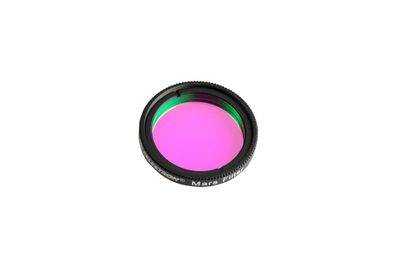- All Products
- Shop by Brands
- BW Technologies
- BW Technologies
- BW Technologies Monitors
- Models
- BW Clip
- BW Clip4
- GasAlertClip Extreme
- GasAlert Extreme
- GasAlertMicroClip XT
- GasAlertMicroClip XL
- GasAlertMicroClip X3
- GasAlertQuattro
- GasAlertMax XT II
- GasAlertMicro 5 Series
- SamplerPak
- IntelliDox Docking System
- MicroDock II
- BW Ultra
- BW Solo
- Gas Monitors
- Gas Monitor Manufacturers
- BW Technologies
- Bacharach
- Biosystems
- Crowcon
- Gas Clip Technologies
- GfG Instruments
- GMI/Detcon
- Honeywell Analytics
- Industrial Scientific
- MSA
- RAE Instruments
- RKI Instruments
- Calibration Gas
- Combustion Analyzers
- Water Quality
- Reliability Instruments
- Refractometers
- HVAC
- Weather
- Temperature
- Laboratory
- Sound
- IAQ
- Electrical
- All Categories
Celestron Mars Observing Filter - 1.25" - 94310
Item #:
CEL-94310
Brand:
Celestron
Share this product:
94310 Mars Observing Filter - 1.25" by Celestron
Celestron's Mars filter combines the advantages of red and blue filters in a single filter to bring out a wealth of detail while allowing maximum light transmission for brighter views. This high quality glass filter contains multiple coatings to maximize light transmission in specific wavelengths, bringing out incredible detail of the Martian surface.
Eyepiece filters reduce glare and light scattering, increase contrast through selective filtration, increase definition and resolution, and lessen eye fatigue. To attach the filter onto an eyepiece, simply thread the male thread on the filter into the bottom of the eyepiece barrel. Then insert the eyepiece (with filter attached) into eyepiece holder of your telescope.
- Premium glass Mars filter with multiple coatings to maximize light transmission in specific wavelengths to bring out subtle details in the Martian surface
- Metal filter housing for durability
Get ready to see Mars in incredible detail. Observe Mars this summer as the planet will be noticeably brighter from early July through early September (July 7th to September 7th). The best night to view Mars is July 28, 2018.
The last time Mars was this close to the Earth and this bright in the night sky was the opposition of 2003. The next opportunity like this won't come around until 2050. This is a perihelic opposition, which means both Earth and Mars are close to the Sun, making conditions ideal for astrophotography.
At opposition, Mars will be 1.8 times brighter than Jupiter and the 4th brightest object in the sky after the Sun, the Moon, and Venus. At its closest approach to Earth on July 31, Mars will be 35.8 million miles from us.















